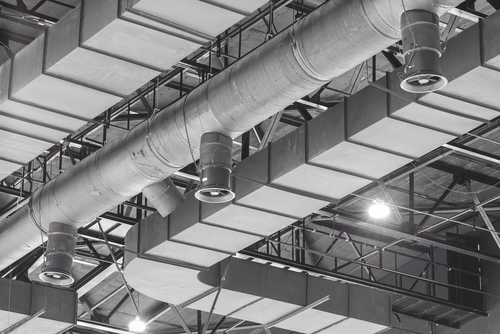Goodway Technologies, a Connecticut-based provider of industrial HVAC maintenance solutions, is reminding facility managers how critical the cleaning and maintenance of an HVAC system is to indoor air quality (IAQ). While many facility managers have long understood the importance of IAQ, the pandemic has brought an increased emphasis on the need to keep employees and occupants safe and healthy. And with “back to work” activity increasing, now is the time to act.

“One of the top priorities for facility managers should be addressing increased concerns over indoor air quality,” says Tim Kane, president and CEO of Goodway Technologies. “Returning employees are naturally anxious over the quality of the air in a post-pandemic world. Executing proper cleaning and maintenance of HVAC systems can help minimize the risk of poor indoor air quality while also providing many other benefits to overall operations.”
Goodway Technologies recommends focusing on these HVAC parts to take the proper steps towards improving indoor air quality:
Duct Cleaning
Ducts can often be overlooked. However, indoor air is recycled through the HVAC system and can spread germs, dust, mold, and allergens throughout a facility. Those contaminants can adhere to the interior of the ductwork, keeping them around for much longer. Duct cleaning can help eliminate those issues.
Cleaning and decontaminating ductwork requires specialized tools to dislodge stuck dirt and debris. First, begin by inspecting ductwork for any large debris such as rodents or other waste. Then use an industrial duct cleaning system or vacuum to loosen and remove additional buildup. Make sure the tool is equipped with HEPA filters for better results. If there is evidence of microbial growth in the ductwork, it may require chemical agents and disinfectants to clean and prevent further growth.
Coil Cleaning
Ignoring evaporator and condenser coils can lead to a build-up of dirt, mold, and other contaminants that can spread throughout the facility. Cleaning the coils provides a safer, and more pleasant, work environment and reduces the chances of the presence of harmful mold spores. In addition, it can help stop the air conditioning unit from emitting a musty, “wet towel,” or “dirty sock” smell.
The location of the units varies between facilities—outside, on the rooftops, or inside narrow ceilings—which means it’s important to find the right equipment to make the job easier and more effective. Luckily, there are a variety of solutions to help overcome these challenges.
Cooling Tower Cleaning
Poorly maintained cooling towers create an ideal place for infectious bacteria, such as Legionella, to flourish. Cooling towers should be inspected for scale and slime on a monthly basis. There should be a thorough cleaning of the tower basin surfaces and the tower fill to remove any debris or contaminants.
Water in cooling towers should be treated with a variety of descaling and disinfectant solutions to manage the risk of Legionella and other bacterial growth. At least once a year, take the time to drain the system and perform a thorough cleaning and disinfection before turning it back on. Consider similar maintenance if the cooling tower system has been offline for a long period of time.
Packaged Terminal Air Conditioner Cleaning
Packaged terminal air conditioners (PTACs) can be easy to forget about when it comes to maintenance and cleaning, but they have needs similar to traditional HVAC systems. The primary filters need to be kept clean and changed on a regular basis. The frequency can vary depending on the environment where the PTAC is located, but they should be inspected at least monthly. The coils should be routinely cleaned.
While not directly related to HVAC systems, Goodway recommends the addition of high-quality portable air filtration systems. According to the company, these systems are added as supplemental air filtration technologies and not only add a valuable and powerful filtration technology, but also offer peace of mind to employees knowing that their facility is taking extra precautions.
Improve IAQ and Reduce Costs
Not only will these proactive steps help improve indoor air quality, but they also provide a lot of benefits to the overall efficiency and cost of the HVAC system. It helps to extend the life of the equipment and reduce the risk of more expensive repairs or system replacement.
